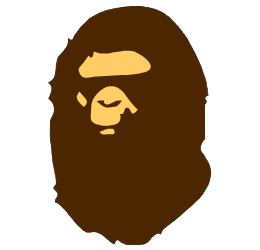Japanese hip hop is hip hop music from Japan. It is said to have begun when Hiroshi Fujiwara returned to Japan and started playing hip hop records in the early 1980s. Japanese hip hop tends to be most directly influenced by old school hip hop, taking from the era's catchy beats, dance culture and overall fun and carefree nature and incorporating it into their music. As a result, hip hop stands as one of the most commercially viable mainstream music genres in Japan and the line between it and pop music is frequently blurred.
Shakkazombie (シャカゾンビ) is a Japanese hip-hop group. Formed in the 1990s, the group consists of Osumi a.k.a. Big-O, Hide-Bowie a.k.a. Ignition Man, and Tsutchie. One of Japan's influential hip-hop groups, they are known for featuring & introducing many artists in their collaborations such as Nitro Microphone Underground.
Hiroshi Fujiwara is a Japanese musician, producer, and designer.
Streetwear is a style of casual clothing which became global in the 1990s. It grew from New York hip hop fashion and Californian surf culture to encompass elements of sportswear, punk, skateboarding, 1980s nostalgia, and Japanese street fashion. Later, haute couture became an influence, and was in turn influenced by streetwear. Streetwear centers on comfortable clothing and accessories such as jeans, T-shirts, baseball caps, and sneakers. Brands may create exclusivity through artificial scarcity; enthusiasts follow particular brands and try to obtain limited edition releases, including via proxy purchases.

Teriyaki Boyz are a Japanese hip hop group from Yokohama, Japan.
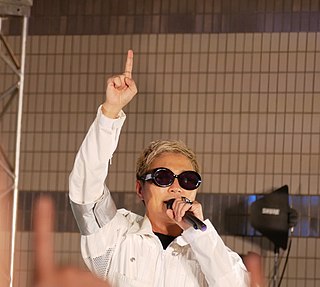
Verbal is a Japanese rapper, music video director and record producer who debuted in 1998 as a member of the hip hop group M-Flo. He is a third generation Zainichi Korean and a notable representative of Zainichi Korean music in Japan.

Billionaire Boys Club (BBC) is an American fashion label based in New York City founded by Pharrell Williams and Nigo in 2003. Its sublabels include Ice Cream, Bee Line and Billionaire Girls Club.
Beams is a Japanese clothing brand established in 1976 in Harajuku, Tokyo by Etsuzo Shitara. The current CEO is Yō Shitara (設楽洋). The brand has 167 stores in Japan, and 10 stores overseas, including in New York City, Milan, London, and Paris.
Kiks Tyo is a Japanese fashion brand founded by DJ, designer, photographer and streetwear/sneaker culture personality hobby:tech in 2006.
I.T is a Hong Kong fashion and investment conglomerate founded in November 1988. It owns a number of Hong Kong brands which it retails as well as distributing European and Japanese brands such as French Connection and A Bathing Ape. It has a large presence in Asia and several stores in a single mall in Richmond, British Columbia.
Brian Donnelly, known professionally as Kaws, is an American artist and designer. His work includes repeated use of a cast of figurative characters and motifs, some dating back to the beginning of his career in the 1990s, initially painted in 2D and later realized in 3D. Some of his characters are his own creations while others are reworked versions of existing icons.
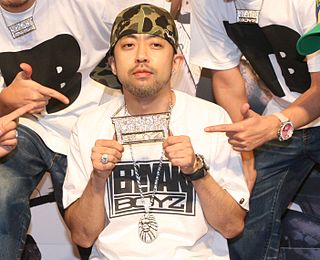
Nigö is a Japanese fashion designer, disc jockey (DJ), record producer and entrepreneur. He is best known as the creator of the streetwear brand, A Bathing Ape (Bape), and currently serves as artistic director for Kenzo. Additionally he is a member of the Japanese group Teriyaki Boyz, serving as their official in-house DJ since the group's 2005 debut.

Comme des Garçons, also CDG for short, is a Japanese fashion label based in Paris, founded by Rei Kawakubo. Its French flagship store is located in Paris, while its other physical retail stores are in London, Berlin, Melbourne, Seoul, Hong Kong, New York City and in the Aoyama district of Tokyo. Other than fashion, the label has expanded to include jewelry and perfume.

Ura-Harajuku (裏原宿) is the nickname of an area in Shibuya, Tokyo, Japan.
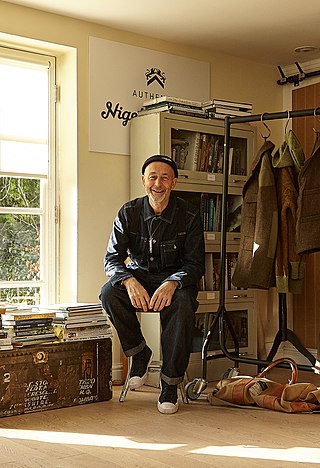
Nigel Cabourn is a British fashion designer known for his outerwear and vintage inspired clothing. He studied fashion design at Northumbria University between 1967 and 1971 and his studio and business is still based in the North East of England.
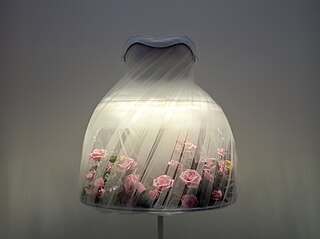
Jun Takahashi is a Japanese fashion designer who created the brand Undercover.

Chrome Hearts is a luxury brand from Hollywood, founded in 1988 by Richard Stark, Leonard Kamhout and John Bowman. It is currently co-owned by Richard Stark and his wife Laurie Lynn Stark. Its logo contains a cross with the brand name around it on a circular ribbon. The brand produces silver, gold, and diamond accessories, alongside eyewear, leather items, apparel, furniture, kitchenware, and random objects. They are known for using leather, silver, and ebony. The production site covers three blocks in the middle of Hollywood and consists of multiple buildings and factories around the world. Production is mainly done in-house at the big production site in Hollywood. As of 2021, they have 1000 staff at their Los Angeles production site. Although not officially disclosed by Chrome Hearts, the brand is estimated to be worth around $1 billion.
Yoon Ahn is an American businesswoman and fashion designer. She studied graphic design at Boston University and graduated in 2000. She is known as the creative director of her brand Ambush and as Dior Men's jewelry design director. Ahn is currently based in Tokyo, Japan.
Andrew Mok, known professionally as YaLocalOffgod, is a Hong Kong fashion designer, model and entrepreneur. He is best known as being the founder of his clothing brand, bandage boy, and currently serves as the graphic designer for Lil Bibby's music label, Grade A Productions. Offgod is a portmanteau of the word 'Off' from Off White and the word God.
William David Marx, known professionally as W. David Marx, is an American fashion and culture writer who works and lives in Tokyo, Japan. He is best known for his first book Ametora: How Japan saved American style, published in 2015, through which he slowly developed the acclaim as one of the "leading writers in Japanese menswear." He later published Status and Culture: How Our Desire for Social Rank Creates Taste, Identity, Art, Fashion, and Constant Change in 2022. Marx also publishes a newsletter titled Culture: An Owner's Manual. Before writing became a larger part of his work-life, Marx worked at Google as part of the Asia-Pacific Team on in Corporate and Product Communication.
